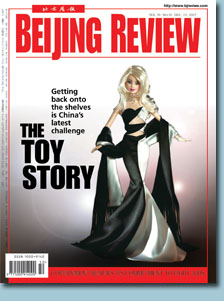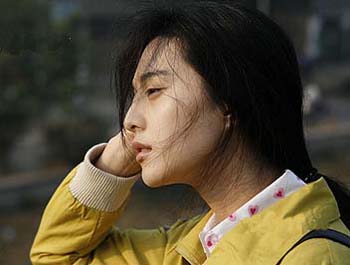Director Li Yu presents a moral struggle of life in modern China in her controversial film: Lost in Beijing
By Wu Yiqing
Newswoman-turned-director Li Yu is bursting onto the international film stage with her new provocative feature about modern China. Her latest, Lost in Beijing (Pingguo), received rave reviews and accolades from many international film festivals. The director, in an interview with Beijing Review, said she is glad to bring the cameo back home as the sexually explicit satire debuts in China in early December.
The film, made in 2006, presented Beijing as a city making huge strides in the modern era, and showed its citizens as fully embracing market economy to an extreme that overthrew traditional Chinese values and severed human ties.
Lost in Beijing is based on a true story Li came across in a local newspaper. Chinese actress Fan Bingbing plays a masseuse named Liu Pingguo, a woman from a provincial city seeking better job prospects at Beijing's Golden Basin Foot Massage Parlor. Things take a surprising turn when the parlor's owner Lin Dong (played by Tony Leung Ka-fai) rapes the drunken Liu while her window-cleaner husband Kun (by Tong Dawei) witnesses in shock outside. The cuckolded Kun then extorts money from Lin's infertile wife Wang Mei (Elaine Jin).
The plot may sound bizarre and the characters' follies laughable, but Lost in Beijing illustrates the bleak reality many Chinese mainlanders have to wrestle with: how to navigate and adjust in a new value system and social order taking root in China's hybrid socialist market economy.
"Modern Chinese people are more rational and smarter than their predecessors, but they have to come to terms with the fact that many things in life cannot be reconciled and balanced out so easily," Li says.
The film received an honorable mention for its screenplay at New York's Tribeca Film Festival last May, and it was also nominated for the Berlin Film Festival's top honor, the Golden Bear award, this February.
A former news anchor at CCTV, Li chose film as her medium of expression beginning in 2001. She says it is a step "closer to capturing reality" than her newscasts, and can better record the sweeping changes taking place in China's burgeoning capital city.
The 31-year-old, soft-spoken young director told Beijing Review that she has had to challenge many social barriers and gender discrimination to reach her goals-a personal quest not unlike those undertaken by the characters in her latest feature. As a fledgling female director, Li said she continually has to confront long-held prejudice within the male-dominated Chinese film industry.
"Many producers told me that girls with a pretty face should act and not direct," she recalled. "Nobody would fund my projects, so I sold my house to make my first film."
Her hard work paid off. Li made her 2001 directorial debut with Fish and Elephant, which won the Elvira Notari prize at the Venice Film Festival. In 2005, her second picture Dam Street scooped up the C.I.C.A.E. award at Venice.
Bringing her newest film home has been a long process for Li. To be screened in Chinese mainland theaters, 15 minutes of the explicit sex scenes in the film had to be cut. "The censorship bureau told me that it was unpleasant to show shots of dirty water splashed in Beijing streets," Li said.
Chinese authorities cut films for explicit content partly because China has not yet established a film rating system that could be used to restrict showings of certain films to mature audiences. Other films, notably Ang Lee's sexually explosive blockbuster Lust, Caution, have also been cut for mainland audiences.
Li said she hopes audiences and critics can look beyond the media hype over the sex scenes. "China is experiencing an economic miracle right now and everybody is busy making money. Sexual relationships are also relationships, right?" she asked.
More importantly, she said sex offers a window to probe into human nature. "The emotional void of Chinese people needs to be fulfilled." Li said she often finds it surprising that the new Beijingers are over-confident to a point that is pitiable. "Just like my characters Kun and Huang Mei [wife of the parlor's owner], they felt everything could be resolved and they stuck to their 'principles,' no matter how wrong it is in the first place."
As a former news anchor for China's news media giant CCTV, Li came across many riveting tales and interesting figures on the job, but said she grew increasingly frustrated with the editorial restrictions imposed upon her. "I was only a teleprompter reader," she says.
Li believes the best way for her to tell the truth and push the envelope is through filmmaking. "As a director, I am very aware of what's happening around me: the reality. I am more reflective of the present, trying to figure out how people are caught up in the whirlwind of events," she says.
One such reality Li wished to show her audience concerns internal migration. None of the main characters in Lost in Beijing hail from the capital -- they are sojourners from different parts of China trying to find their fortunes in the capital. "They are like me: [people] who are lost in the city's conflicting new morality and are thrust together through chance circumstances," Li says. The director was born in Shandong, a coastal province in east China.
Fan and Leung deliver refreshing performances. A rising Chinese fashion queen who is best-known for flaunting her face in glossy magazines and for waltzing on runways, Fan embodies a pitiful and demure worker. Meanwhile, Hong Kong superstar Leung personifies the many repugnant and greedy Cantonese entrepreneurs who earn big bucks with their sprawling businesses in Beijing. It may be surprising to learn that such emotionally rich performances stem from Li's single acting instruction: "To talk and walk like a human being."
Li said she asked the stars to shed their luster and embody the gait of ordinary people. Fan's lackluster appearance and motherly image came as a surprise, but it won her the best actress award from the Kazakhstan International Film Festival in October.
While action-packed Chinese costume dramas and dark social commentaries on rural China (most notably by Zhang Yimou, Chen Kaige and Li Yang) have become the postcards of modern China, Li says international audiences should be exposed to more varied subject matter. "Chinese films should not be just about peasants in villages. I want to show the world the predicament of different people as they struggle to make a living in big cities like Beijing," she says.
Li says Beijing is a treasure trove for filmmakers. "I said 'no' when people asked me to venture abroad. China is the best place to make movies now, I don't want to miss all the good stories here," she says. "As a Chinese director, I am responsible for recording the new era. I want people to feel the pulse of Beijing that is undergoing sweeping changes."
(Beijing Review December 11, 2007)




